RECOIL OFFGRID Survival Building Rapport: Tips on Working with Foreign Populations
Survival isn’t an easy game. It gets exponentially more difficult when you find yourself surrounded by a population that speaks a different language, eats different food, with different cultural norms than what we’re used to. Whether you’re on a business trip, overseas vacation, or a combat deployment, building rapport among a group of people wholly different than your own is imperative to survival and success. Ingratiating yourself to a foreign populace while also protecting your own safety is a complex but critical skill for anyone looking to go abroad.
Instead of opining on the topic with our best estimates, we compiled a panel of RECOIL OFFGRID contributors who have spent their careers living and working alongside foreigners, for an in-depth discussion about best practices for navigating this nuanced survival situation. We put together a list of questions that address both how to endear yourself as an outsider, as well as how to look out for yourself along the way.
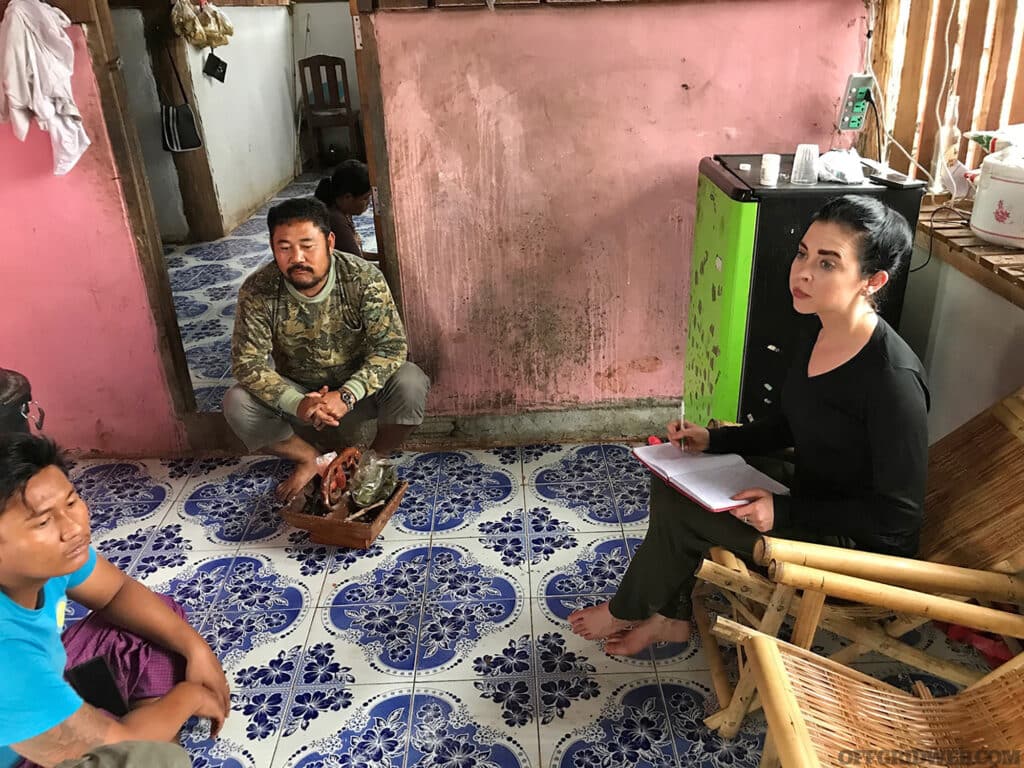
Above: Building rapport takes patience. Hollie McKay visits others in their own homes to make the connection more personal.
War correspondent and freelance journalist Hollie McKay, who has spent time working near the frontlines in war-torn countries such as Iraq, Afghanistan, Syria, Yemen, Myanmar, and Ukraine (see Issue 51 for Hollie’s article about escaping the fall of Afghanistan.)
Military veteran and former law enforcement officer Timothy Lacy, who spent years training Afghan Border Patrol forces as a private military contractor (see Issue 46 for our Spotlight interview with Tim.)
Afghan-born Army Special Forces sergeant Kawa Mawlayee, who emigrated to America during the Russian invasion of his home country. Not only did he have to spend his childhood growing up in American culture, but he also then went on to spend years specializing in working alongside foreign fighters in Iraq and Afghanistan as a teacher and combat leader specializing in irregular warfare. (See Issue 52 for our Spotlight interview with Kawa.)
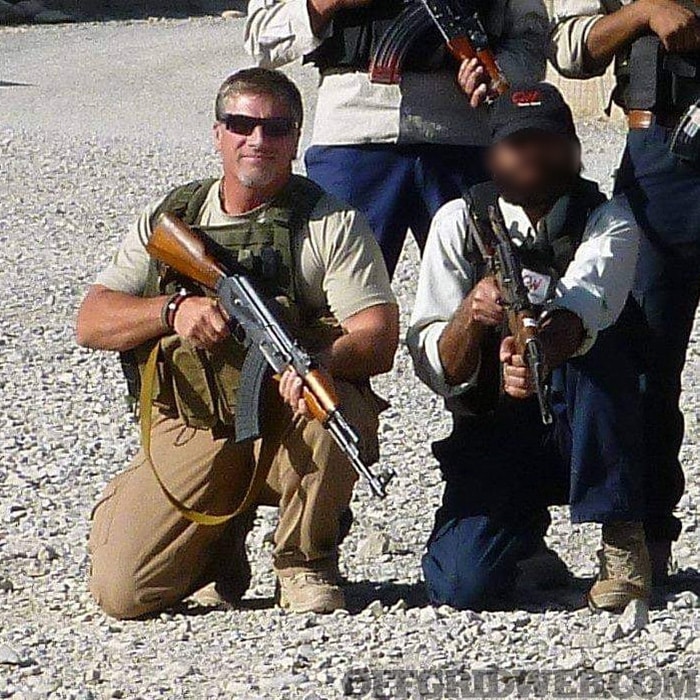
Above: Even if there is a language barrier, commonalities can help bridge the gap. Timothy Lacy is building connections via occupation.
1. What is the number-one rule you abide by to assimilate into and survive among a population that’s foreign to you?
Hollie McKay: I have two rules. First of all, never go in without research. Have a sense of who you’re going into. What is the standard dress code, what do they eat, how do they have their meals, what is the cultural norm between men and women interacting? So, don’t go in blind. Do your research. Second to that, I always say the number-one rule, no matter what, is to learn the word thank you in their language. I think thank you is the most important word in any language. If you can’t say anything else, you can nod and smile and say thank you, and that will get you a long way. Just in terms of assimilations and in terms of being welcome and accepted in that community.
Timothy Lacy: My number-one rule has always been to remember that I am stepping into their world, and to be respectful of their way of life, their traditions, and language or different dialects. Along with that is to do a country study so that I can better understand their history and traditions, and how they view me.
Kawa Mawlayee: From my gained knowledge and experience of working with foreign governments, agencies, and their citizens, there isn’t just one rule to abide by — there are many. However, the term “assimilation” is the umbrella term for how to blend in, build rapport, operate, and survive in an environment foreign to your own. There are many implied tasks that fall under the term assimilation. It begins with research and learning, almost memorizing knowledge about this new environment. That would include topics like: documents needed for entry/exit of environment, points of contact for embassy or friendly consulates in case of emergency, local cultures, customs and etiquette, image projection, languages spoken, religious considerations, health concerns (i.e. vaccines, medicines, etc.), operational climate, situational awareness and security, methods of communication to adjacent units or friendlies, identifying key leaders or contacts, identifying hospitals or medical treatment facilities, areas to avoid, placement and access to other certain areas, currency and exchange rates, understanding routes to and from, transportation, and local crime, militias, gangs, law enforcement or military presence. The last one, but possibly the most important, is abort criteria.
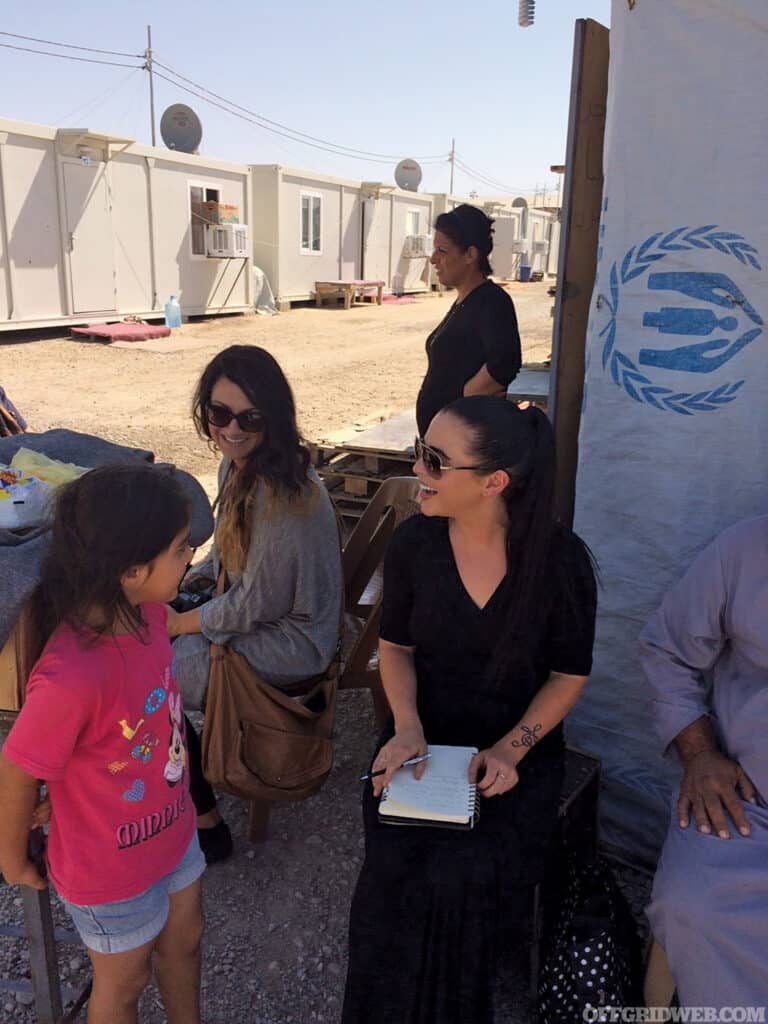
Above: Hollie McKay meats with the local populace to better understand their needs.
Documents needed for entry/exit: Visa requirements, work documents, certifications, accreditations, medical paperwork (i.e., COVID vax cards), etc. Think of anything else you would need to verify your story, cover, or reason for doing what you’re doing there.
POC for embassy or friendly consulates: This doesn’t necessarily mean you need names of people who work there but more so, how to go about gaining entry into these facilities in case of emergency. This could mean emails, phone numbers, access protocol or possibly actual names of points of contacts who can vouch for you.
Local cultures, customs, and etiquette: To successfully blend into a foreign environment, this is crucial. You must understand and adhere to the social norms of the environment you’re in. This is the how-tos and the dos and don’ts of the environment. This might be hard to understand for us Americans because we’re a melting pot of cultures and customs. However, in foreign countries this can make you the gray man or make you stick out like a sore thumb. A few examples of this are: how to greet people, don’t talk directly to the women, don’t even look at the women, hand and arm gestures, tone of voice, removing shoes, impolite to tip at eateries, eating or drinking in public or at a certain venue, offering food to a guest before serving yourself first, observance of holidays or local traditions, and how you dress.
Image projection: Think of this as how to look, act, walk, and talk while in this foreign environment. If you show up with first-world clothing and everyone else is dressed in traditional garb, you immediately bring unnecessary attention to yourself. One of your first acts in this new environment is to ditch all your clothes for local clothing (to a degree). We can’t exactly operate in sandals, can we? Image projection isn’t limited to dress. It’s how we walk sometimes. In most foreign countries, locals walk at a slower pace, almost without purpose. Most of us Americans walk with intent and pride (i.e., shoulders rolled back, chest out, completely upright and most times, in a hurry to get to where we’re going). Talking implies understanding the tone of the language. In most foreign countries, locals don’t speak too loud, but rather calmly and in an almost lethargic manner. We can’t be the ugly Americans demanding things and making our presence known. Overall, our acting needs to be right on par with those in our environment. We must blend in with our actions and in the manner of how we do things. Again, be the gray man or bring attention to yourself.
Languages spoken: No one is saying that you need to be fluent in your environment’s local language, but you must possess enough linguistic knowledge to get by. The more of the language you know the better, but also understand that the moment you open your mouth and speak, they will immediately realize that you’re a foreigner based off your lack of knowledge but also your terrible accent. Asking questions is OK, but we have to know some of the basic daily phrases or terms in order to operate. We’ll cover this a bit more in depth, later in the article.
Religious considerations: This isn’t about practicing local religions. It’s about the knowledge of the religions and how that effects the culture it surrounds as well as daily life in that environment. That last thing you want to do is offend members of a certain religion because you didn’t take your shoes off inside the mosque or you sat on the wrong side of the temple. This also could be as simple as knowing prayer times, dietary restrictions, or business hours. If everyone is in the church, synagogue, or mosque and you’re the only one out on the street … well, sore thumb. And whatever you do, do not partake in any religious discussions. You could see how that would most likely end badly for you or at the least turn heads in your direction.
Health concerns: Consider which vaccines you should get before entering this foreign environment, so you don’t catch things like malaria. Otherwise, keep a healthy amount of antibiotics and other meds (OTC or prescription, on you). Once there, find local shops where you can source them.
Operational climate: This means, you need to understand to what level you can operate in this new environment. This may mean completing a full risk and threat analysis or it could be as simple as just knowing which areas are heavy with military, cops, or security cameras, which could also determine your hours and methods of operation. Depending on your timeline and objectives, you need to plan ahead as much as you can, have a primary, alternate, contingency, and emergency (PACE) plan for everything you do and don’t overdo or take too much risk at once.
Above: Maintaining situational awareness will prevent potential dangerous encounters.
Situational awareness (SA) and security: We talk about SA all the time. Be aware of your surroundings. Do your 5s and 25s, meaning check your immediate 5-meter radius and also scan ahead to 25 meters or more. Look for threat indicators. Look for anything that sticks out from the norm of your environment, including yourself. Never let your guard down, but also don’t rubberneck, bringing unnecessary attention to yourself. Security could mean weapons that you may have on you for last-resort or emergency, or it might be security in the sense of knowing how to add layers of access to get to your residence or place of rest. Security could also mean that you have routine check-ins with friendlies or adjacent units like a quick reaction force (QRF) who would be ready to roll in covert/overt and get you out of there ASAP.
Countersurveillance: We don’t need to be spies, but we do need to understand what to look for in case we are being surveilled or being followed. Let’s just say that if you’re going to meet with someone who is working for you or with you, we don’t necessarily want to take our unwanted friends into that meeting and compromise ourselves or our contacts. So, it might be best to stop at a couple places on your route to your meeting or specific task and look for people who you’ve seen before in a different part of town. This could include men, women, children, or vehicles. But these stops need to make sense to your pattern of life (i.e., cafes, restaurants, supply stores, etc.).
Methods of communication to adjacent units or friendlies: This could be as easy as routine phone calls, texts, or in-person meetings. Or it could be as complicated as going to a local bookstore and placing a message inside a specific book in a certain position in the stack, on a specific page and only with coded numbers or letters. Now we’re getting into tradecraft and not something I can discuss. The bottom line here is who knows you’re there and do they know what your operational status is (i.e., dead, alive, success, abort, support, etc.)?
Identifying key leaders or contacts: This could mean we have contacts in this environment that can support what we’re doing or enable us in some way that we can’t gain organically. It could also mean we may need to make some new friends who could support us with things like transport, safe passage, shelter, weapons, communications, access, or introducing us to more relevant people.
Identifying hospitals or medical facilities: This is a no brainer. Unless you’re a combat field surgeon and can patch yourself up, you need to know where the nearest and possibly, the most low-key medical facilities are to gain medical supplies or have someone save your life without compromising who you are and what you’re doing there.
Above: Trust your intuition. If an area seems dangerous, it is best to avoid it.
Areas to avoid: This is good to know so we don’t accidentally walk or drive into an unknown gang, militia, or crime-ridden area and end up being questioned, harassed, or worse. In some places, these gangs operate openly and in others, they remain hidden until they strike. Always have an exit plan.
Placement and access to certain areas: Depending on what you’re doing there, you may find it very difficult to gain access to a facility or area without some help from local friends. Also, you may need placement to other areas or facilities where only employees are allowed and without your local friends, it may be impossible to gain intel from.
Currency and exchange rates: This is something we can easily prepare for beforehand. Depending on your level of operations, you can bet that credit cards and any other form of digital currency will leave a digital footprint. Cash is king in most foreign countries but having some U.S. dollars could help enable some tasks, while equally bringing the wrong kind of attention to yourself for other tasks. Know where you can go to exchange some currency and plan ahead for your budget.
Understanding routes to and from: Unless you have a personal driver, you must use public transportation or walk. Knowing bus routes, times, and schedules can make your travels very inconspicuous and give you the advantage of not being followed. Using taxis can be a good thing if you feel like they can be trusted. It’s also best not to have the taxis take you to the doorstep of where you want to go, but instead stop a couple blocks short. You can also use multiple forms of transportation as a means of getting there while conducting counter surveillance or losing a tail.
Knowledge of military, police or militia presence: We need to understand where these key points are to avoid them. In most foreign countries, police, and military can and will randomly stop you to question or interrogate you. If your story doesn’t add up, they can and will detain you and now you’re in some serious trouble. Have work-arounds and plan accordingly.
Abort criteria: I’ve saved this for last because it is the most important piece of a mission in your foreign environment. What would it take for you to abort what you’re doing and leave this environment? Is your residence compromised? Is your identity compromised? Are you now a wanted person or person of interest? Did one of your contacts become compromised? Did they give you up? Did comms go down? Did you get hurt? Everything you plan each time you step out of your residence needs to have an abort criteria as well as a plan of execution on how to get out. Think PACE plan.
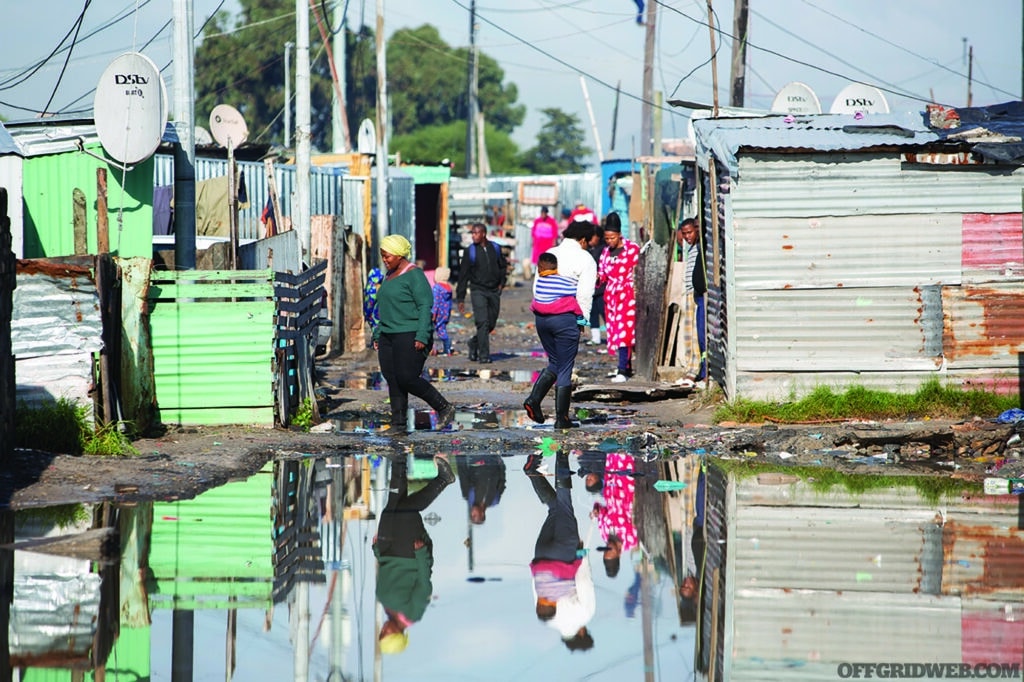
Above: An impoverished area affected by flooding can be an opportunity to help those in need.
2. Are there any normal behaviors or clothing habits you had to unlearn because you realized they’re dead giveaways that would make you stand out in a way that’d draw unwanted attention?
HM: I think my rule of thumb with that is to always be more conservative. If you’re a little bit unsure, always err on the side of caution, which means obviously nothing form fitting. Don’t be showing too much skin or too much cleavage. Even if people, and perhaps women, in that particular place do maybe wear short sleeve shirts. Even in Baghdad, I remember the women there were quite Western-dressed and were wearing sleeveless tops and things, but I wore sort of a very baggy kind of long black dress. So, I just think, always be on the side of caution even if that means you’re a lot more covered up than the locals. That is going to help you be a bit more of the of gray person, rather than drawing unwanted attention. Especially if you’re a foreigner and showing too much skin, the reality is that you will get unwanted attention. When I’m trying to do my work, that is a big distraction.
TL: Absolutely, I’ve not been to a country that had the same behaviors or clothing habits as where I’m from here in the United States. Even we as Americans have regional differences.
For example, I lived in Europe for six years. I learned very quickly how to change my clothing and behaviors. Of course, an obvious giveaway was language. I became fluent in German, with an understanding of other European languages. While in the Middle East and Asia, I couldn’t disguise my ethnicity aside from speaking German and dressing as a European.
KM: Essentially, we’re talking about image projection. On my ODA [12-man Special Forces team], I was a stickler for how we portrayed ourselves in public and not just in foreign countries or transient places. A lot of SOF guys get a little too comfortable with the military look. This includes the Salomon boots, Suunto watches, button-up short-sleeved shirts and some type of outdoor khakis, brand-name outdoor backpacks, and of course, the baseball cap. Add that to our demeanor, body language, and the fact that we usually walk together, and it screams military or ex-military contractors. This theme is where Hollywood gets the cliché look from on films and TV shows.
Personally, I was the guy who dressed down and completely disassociated myself from the military during my travels with the team and solo. No boots, high speed watches, or baseball caps. As a note, baseball caps are very uncommon in foreign countries. Again, this comes back to research. No one is as high speed as they look, but when it comes to not bringing attention to yourself, it’s not hard and some discipline is needed.
As for normal or patterns of behavior that we need to pay attention to, there are a few worth mentioning. One is how loud we can get within our group. We’re so used to being loud back in America because it’s embedded in our culture. In foreign countries, there are places and times where that is appropriate, but not when you’re working and need to stay a bit more low-key. Another one that sticks out is dipping (the use of chewing tobacco). A lot of soldiers dip in the U.S., but in foreign countries, it’s the equivalent of seeing someone pull out a crack pipe in the street and smoke it in front of you. Heads will turn, if for nothing else … curiosity.
We all know what shop talk is. Oftentimes when we’ve been in our new environment for a little while and feel safe, we tend to get a bit complacent with operational security. This is never a good idea. There is a difference between feeling safe and maintaining OPSEC. Shop talk stays in the shop, never out in public. Lastly, if you are in groups, that doesn’t mean that we need to maintain a group posture. Break up into two-man teams or solo and maintain a lower signature. If you’re alone, then this doesn’t apply, but image projection and patterns of behavior absolutely do.
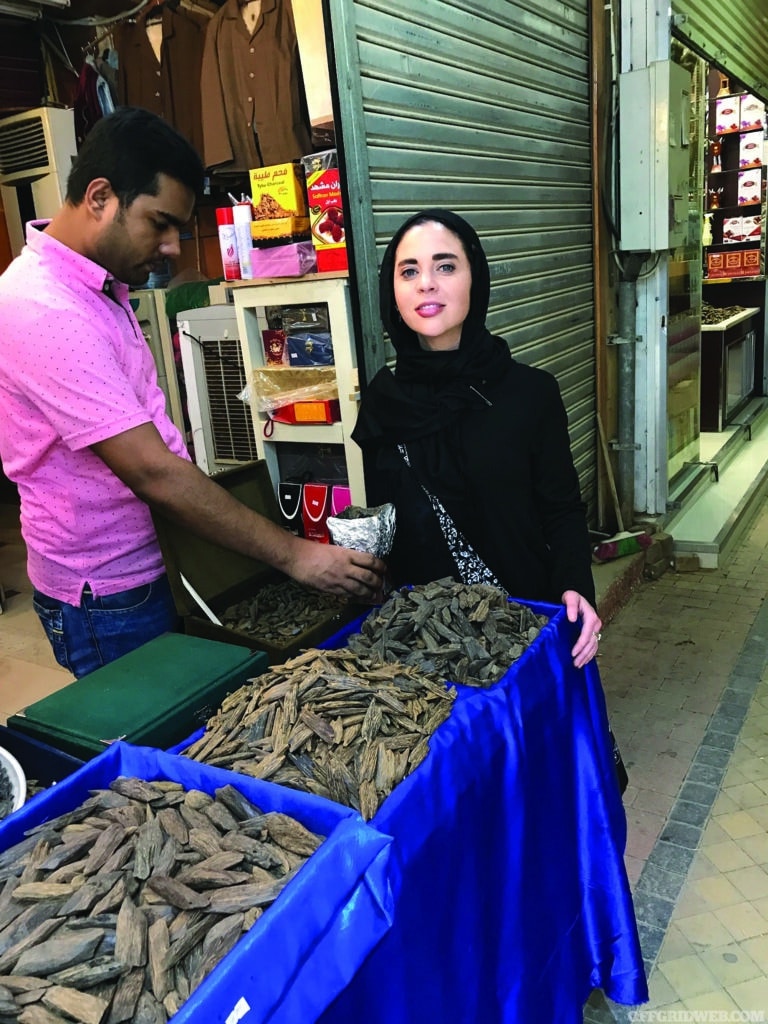
Above: Visiting a local market is another chance to interact with the locals and build stronger relationships.
3. If you have little to no understanding of the local language, how does that affect your ability to build rapport and maintain safety?
HM: Even if I do have an understanding of the language, there are usually so many different dialects, they vary not just within countries but within provinces, districts, and villages. So it’s always really useful to have a local interpreter with me who I trust, someone I know who can support my work, so that’s a real must for me. I don’t think that’s ever impacted my ability to build rapport, having that middle person. I think as long as you are sitting with a particular subject, speaking to them, when I ask questions, for example, “How are you?” I’m looking at them, I’m looking in their eyes, I’m asking them the question, and my interpreter is then interpreting. I’m not looking at my interpreter going “Can you ask her how she is?” So, I think it’s really important to act as though you are speaking the same language, and then have a very good interpreter by your side that can be that very smooth interluder.
TL: For me, it depended on the locals’ attitude toward Americans. Hand gestures and pointing at objects only get you so far. And expecting that they speak or understand English wasn’t a good idea. That’s where doing a thorough country study including some basic phrases and learning words that may mean danger in the native tongue prior to arriving was critical. Befriending your interpreter, if you have one, is a huge asset.
KM: We discussed language and its importance earlier. Going into a foreign environment and not knowing even the basics of that language is 1) disrespectful in the eyes of the locals and 2) brings a lot of attention to you. In my experience, when you appear to not know the language and ask for help, it attracts third parties or more locals and more than likely the local you’re trying to communicate with will recruit help from others to try to understand you better. Before you know it, you might have a group of people surrounding you trying to help but also creating a larger signature than you wanted. Take the time to learn some basics and also use your smartphone to assist. Google Translate is a great app that you can type into, talk into, or even use the camera video to translate a foreign language in real time on your screen. I’ve used it multiple times overseas and it works great. Worst case scenario, you can speak English into it and it’ll play back in the language of your choice for the local you’re interacting with. However, nothing beats speaking and being able to listen and understand a foreign language. Your linguistic ability is a great rapport builder in addition to understanding and appreciating their culture, customs, and traditions.
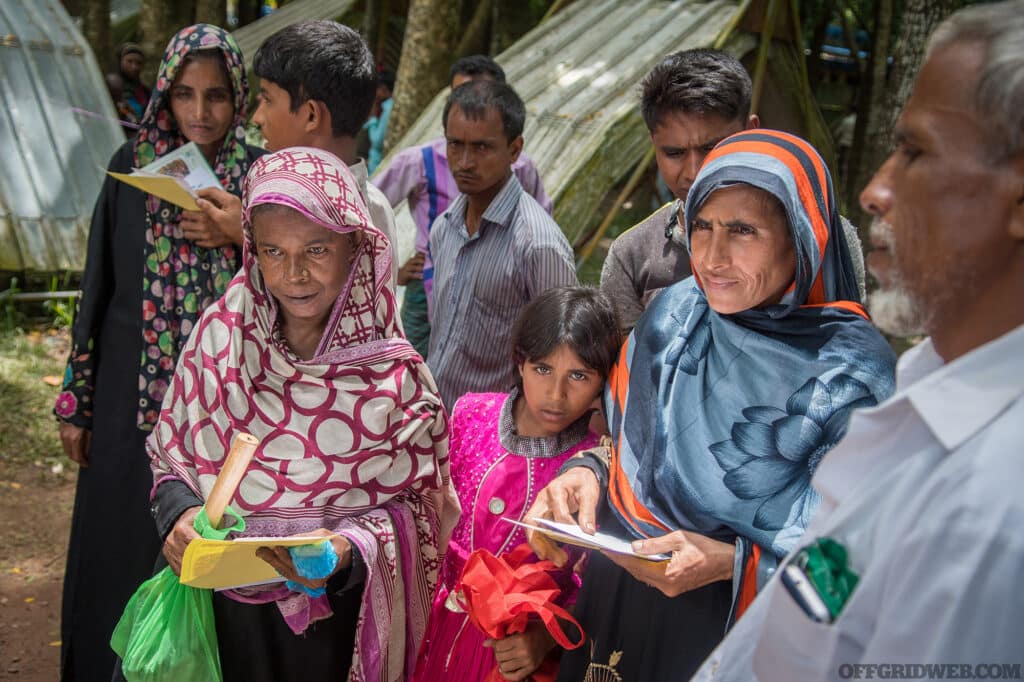
Above: Working with people in distress, such as those affected by natural disasters, can be challenging. But the outcome is a stronger understanding of the people involved.
4. Are there any behaviors or habits you’ve found to be universally applicable to surviving among different populations?
HM: That goes back to what I said in the beginning, always say thank you if that’s the only thing you learn. When I’m working, the people around me are the story. I’m not the story. If you sort of make yourself the center of attention, you become the story. I think that is really key for me, to be as under the radar as much as possible to really blend in with the locals. That is the beauty of being a writer and not having to go in with lots of crews and other things that will automatically draw attention to you. So I think, for me, the universally applicable way of surviving is research and being a pleasant person to be around without being loud, without drawing attention to yourself, and trying to mirror the people around you in some way. Act the way they act and try to blend in.
TL: Always be respectful of the culture, customs, religion, and habits of the people you’re working with. You don’t have to agree with it, but if you’re going to be successful and survive, you must be respectful.
KM: If we think about this as a social experiment, there are some universal behaviors and habits that can help us get by or even build rapport. Stay humble, stay modest, and always be friendly and respectful. Observe behavioral patterns within this new environment and try your best to mimic them, to a degree. Smile and don’t be intimidated or cold toward strangers. This doesn’t mean be overly social but if you make eye contact with a local, a simple smile and head nod or basic greeting is the easiest way to make them forget about you. Be open-minded to adopting new behaviors or habits. Blending in isn’t just about appearance and demeanor. Blending in can also mean a complete immersion into the local culture. Once people look at you as one of them, they will tend to forget about you.
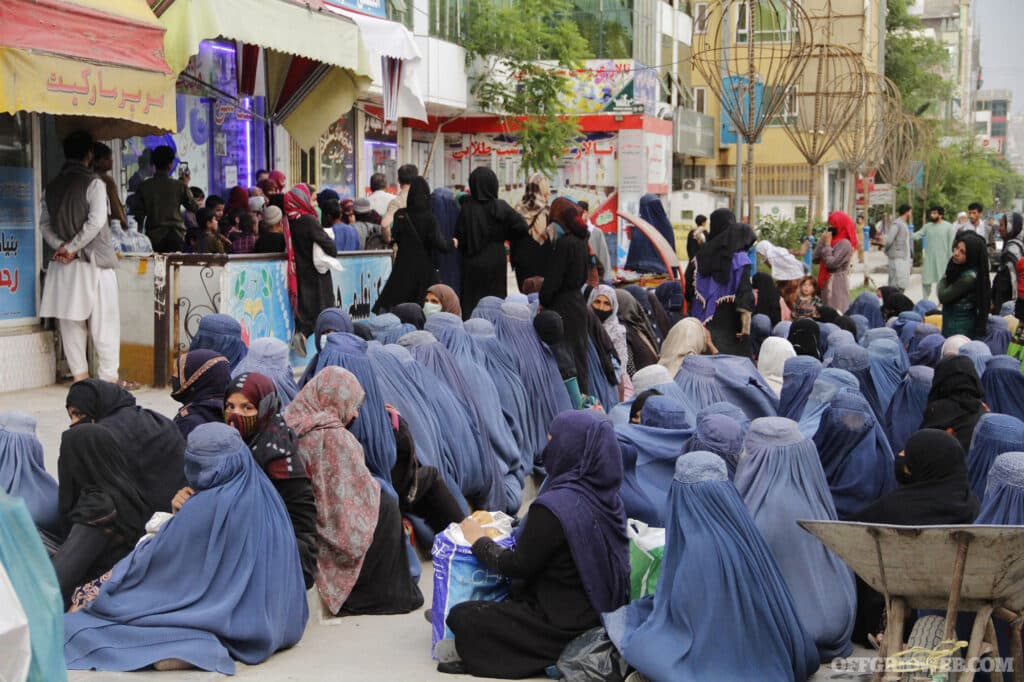
Above: Women await the arrival of food rations. Knowing how people in a region must operate to survive can provide possible avenues to lend aid and build rapport.
5. How do you interact with locals if you know your ethnicity is automatically going to be called into question and potentially make you a target?
HM: I think you can’t let that get the better of you. Again, that’s about research, about being smart and having good instincts. Not putting yourself in a situation that’s going to be hairy for no reason.
I’m not even a soccer fan, but I call it the universal language. Pretty much every country you go to, you have this soccer-loving population, whether they’re 65 years old or 5 years old. So, I always have a soccer reference ready to go, and that really breaks the ice too. I think that’s a universal sport that people automatically warm to and they feel that they can share. I will learn very basic soccer knowledge about that particular country before I go just to be able to break the ice with that conversation.
In terms of knowing you’re going to be a target, that can happen anywhere, and it’s often going to be unavoidable being a conflict reporter. But again, you’ve got to trust your surroundings, and trust the people you’re with, you’ve got to take precautions knowing how long you’re going to be in a particular place or situation, and then it’s sort of a day-by-day, minute-by-minute thing. It’s something that’s just unavoidable if you’re going to immerse yourself in this type of work.
TL: I found that learning some of the language always seemed to help. It usually had the effect of having the other party relax, or at least find humor in my poor pronunciation. There were times when I would wear local clothing in areas I knew that I, as a Westerner would be viewed negatively. Again, showing respect, not weakness gained me a lot of mileage.
While working with and training foreign militias and military, I had to gain their trust. More than once the thought of being gunned down by one of them entered my mind. For me, showing strength and being unyielding on standards, but also having the ability to show compassion seemed to work.
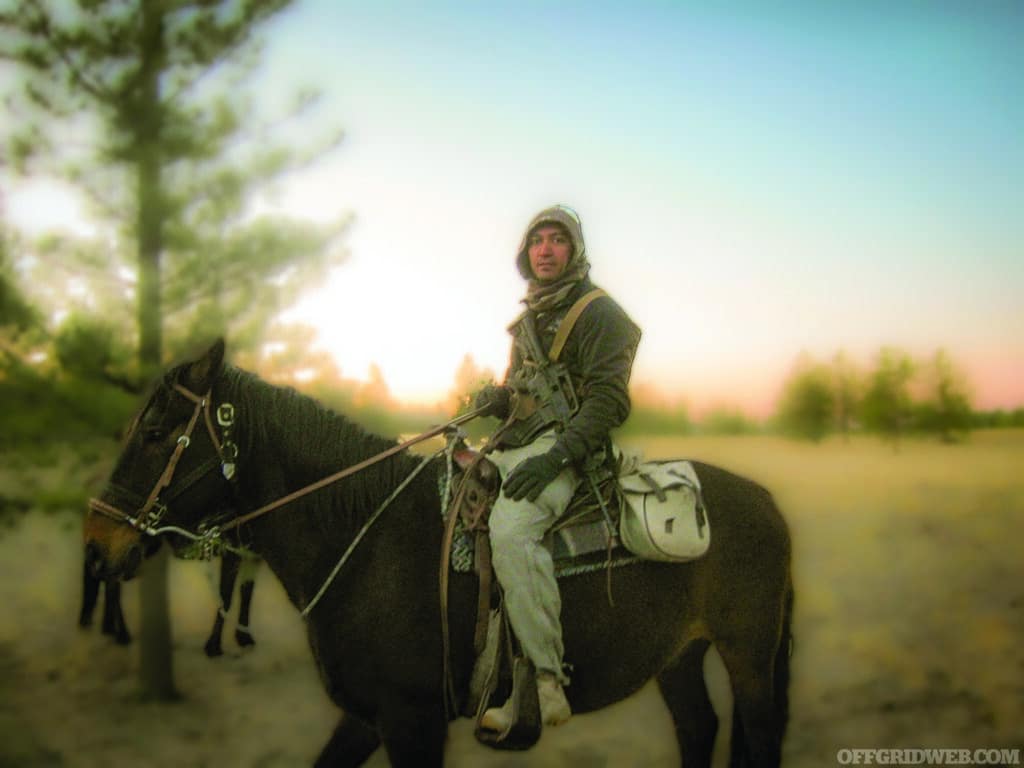
Above: Kawa Mawlayee sits atop a mule in preparation for the days events.
KM: This is a situationally dependent answer. It will depend on who you say you are, where you are, and what you’re doing there. It will depend on how well you know the language, the culture, the traditions and what your pattern of life is while there. But also, don’t assume that just because they’re treating you differently that it means it’s time to flip that switch and kill everyone in the room. They might not be used to seeing someone different from them and they might just be curious to interact with you. In fact, in many countries it’s very common for locals to approach and interact with foreigners. In general, tourism is still very common in foreign countries. You can find Americans or ethnically contrasting people in every corner of the world.
This may also take a combination of many things we’ve discussed in our first question and how well you can control your words, actions, and emotions during confrontation. I tell people all the time that learning how to verbally de-escalate a situation is as crucial as learning how to draw a gun from a concealed position under time. In the end, this is a lifestyle that needs to be practiced just like any other technical skillset we adopt. However, if you can sense danger then like we said earlier, always have an exit plan. If things get violent or physical, you’ve probably failed in a big way and it’s time to get out of Dodge.
Sources
Hollie McKay > holliemckay.com
Timothy Lacy > facebook.com/guerillamentor
Kawa Mawlayee > 2alphatraininggroup.com
 STAY SAFE: Download a Free copy of the OFFGRID Outbreak Issue
STAY SAFE: Download a Free copy of the OFFGRID Outbreak Issue
No Comments